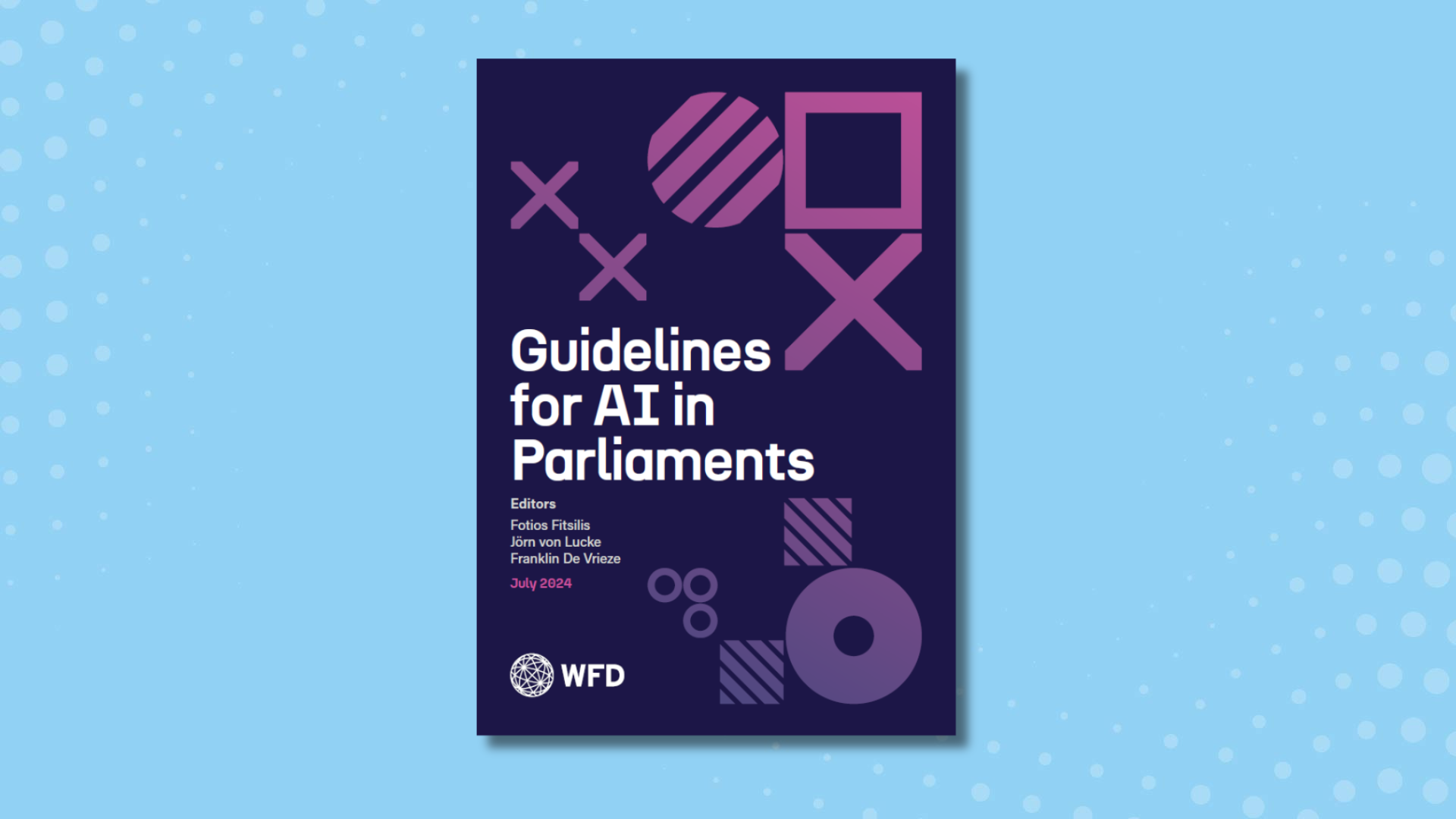These AI guidelines for parliaments not only promote responsible AI use but also empower parliaments to mitigate the risks of AI whilst leveraging AI’s potential to strengthen their functions and serve citizens better. They were developed by a technical working group of 22 expert parliamentary scholars and professionals from 16 countries.
Part 1 of the document - the introduction to the guidelines - describes AI and generative AI, and outlines why we need guidelines, the challenges of using AI in a parliamentary setting, and how AI could be used in parliaments.
Part 2 of the document contains the guidelines. Following a summary, the detailed guidelines are organised into six sections, covering a range of critical issues:
• ethical principles
• artificial general intelligence (AGI)
• privacy
• governance
• system design
• capacity building
Each of the 40 guidelines is presented in a structured format, aiming to address three main questions:
• Why does this guideline matter?
• Are there known examples of its implementation?
• How can this guideline be implemented?
Brief further considerations and recommendations are also included in each guideline.
Part 3 briefly outlines a way forward in the development of guidelines for AI in parliaments.
Part 4 contains a list of abbreviations, a glossary, and the bibliography.
Background
Artificial intelligence (AI) offers a transformative opportunity for parliamentary processes. It can increasingly be used for a variety of purposes, such as debate transcription and translation, summarising documents, support in drafting legal documents, and communicating with citizens. Several forward-thinking parliaments are already experimenting with or applying AI applications and the potential benefits are substantial, spanning various aspects of parliamentary functions.
While AI’s impact in legislative drafting is still being studied, it can already contribute to analysing vast volumes of legal documents, identifying patterns, and suggesting improvements. Additionally, AI algorithms can summarise lengthy reports, bills, and committee findings, making parliamentary documents more accessible to lawmakers and citizens alike.
This promotes transparency and facilitates informed decision-making. Moreover, AI-powered chatbots can engage citizens by providing real-time information about parliamentary activities, thus enabling greater public participation. AI models can also offer predictive insights by forecasting trends, potential policy impacts, and public sentiment. Subsequently, such foresight enables lawmakers to proactively address emerging issues, enhancing the effectiveness of parliamentary work.
Since late 2022, we have witnessed the rapid adoption of generative pre-trained transformers (GPT), AI technology which offers unforeseen potential to enhance parliamentary functions. While several institutions responded quickly, the vast majority remain without clear strategy, unsure how AI tools can be developed, implemented, and used. These guidelines are intended to stimulate digital innovation and responsible adoption, while preventing threats that AI may pose to democracy and humanity, today and in the future.
This publication was developed over 8 months, from September 2023 until April 2024, by a technical working group of 24 expert parliamentary scholars and professionals from 17 countries. The document considers several AI technologies and their application relevant to parliaments; the challenges and barriers to their adoption; and the evolution of AI regulation.
The guidelines
The following 40 guidelines, classified into six sectors, provide general guidance for developing custom regulatory frameworks for the parliaments of the future.
For each guideline, a set of key questions are answered: Why does the guideline matter? Are there known examples? And, how can this be implemented? Each guideline concludes with suggestions on how to use them, and how stakeholders can adopt and adapt them in parliamentary AI projects.
The guidelines emphasise ethical principles, including accountability, transparency, and fairness. They stress the importance of respecting human dignity, privacy, and cultural diversity, while also addressing biases in data and algorithms. Promoting human autonomy and decision-making is highlighted, with recognition of the potential impact of AGI. Privacy and security considerations are crucial, requiring robust measures to safeguard personal data and prevent cyberattacks.
The guidelines outline how effective governance and oversight are key to aligning AI use with democratic values and ensuring transparency. System design and operation should prioritise interoperability, transparency, reliability, and safety, alongside regulation and monitoring of AI systems. Capacity building and education are emphasised to equip parliamentarians and staff with the necessary skills and knowledge for responsible AI use.
Collaboration with stakeholders and public education efforts are encouraged to foster understanding and acceptance of AI in parliamentary processes. Collaboration among parliaments and with parliamentary organisations is considered crucial for sharing experiences and resources to accelerate AI implementation.
Summary of the guidelines
1 | Ethical principles
- Accountability and transparency
- Respect for human dignity, rights, and privacy
- Fairness, equity, and non-discrimination
- Addressing biases in data and algorithms
- Upholding intellectual property rights
- Preservation of human values and cultural diversity
- Evaluation and mitigation of unintended consequences
- Public participation and engagement
- Respect for the rule of law and democratic values
- Promotion of policy goals
2 | Artificial general intelligence (AGI) and human autonomy
- Promotion of human autonomy
- Ethical requirements for designers and developers
- Recognition of AGI as a real prospect
3 | AI privacy and security
- Embedding safety and robust security features
- Including privacy-by-design concepts
- Secure processing of personally identifiable information
- Outsourcing considerations
- Consideration of data sovereignty issues
- Ensuring the integrity of source material
- Risk of overreliance on AI
- Securing training and testing data
- Human oversight in security decisions
4 | AI governance and oversight
- Integration into a broader digital parliamentary strategy
- Efficient data governance and management protocols
- Establishing a parliamentary ethical oversight body
- Assessing the effects of parliamentary AI
- Securing access to and control over the data
- Cooperation with stakeholders
5 | AI system design and operation
- Implementing standardised data schemes and processes
- Emphasising AI algorithms' explainability
- Building robust and reliable AI systems
- Regulating the use and deployment of AI systems
- Assessing risk
- Monitoring and evaluating AI systems
- Agreeing minimum accuracy levels
6 | AI capacity building and education
- Establishing expert teams
- Organising training programmes
- Supporting knowledge exchange and cooperation
- Documenting AI-related activities
- Public education about the use and limits of AI in parliament






